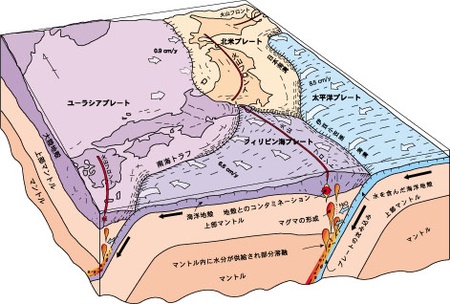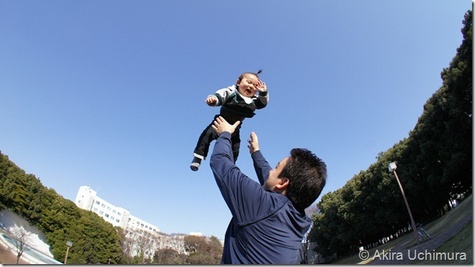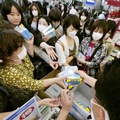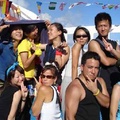Read Part 1 >>
*What was your experience with the earthquake?
We were in our Nikkei Youth Network office located on the 6th floor of a building in Shibuya, Tokyo. Around 3pm, we felt as if our building was being hit and pushed by someone. With my colleague Mao, we ran down the stairs and to the Aoyama Gakuin University, which is right besides our building, because they have an open air space as a refuge in cases like these. From there, we could see how the skyscrapers would move as if they were made out of soft plastic, and hear the windows give these scary noises as if they would break at any moment. After 15 min, we went back to the office, but had to come running down again 5 times since aftershocks kept coming.
Here’s a video of what I took when we left our building. Notice the green building at the end of the video.
Click here to watch the video >>
I tried to call my wife and 10-month-old son but none of the telephone lines worked. That was what worried me the most because I knew they were out of the house in a playground for babies. Finally at 8pm we got a hold of each other through Skype. Internet was the only communication medium that was still working. So then I got calm, we had not heard of the terrible news in the north yet. While, I was waiting and watching the news on ustream, I started receiving many messages on my Facebook and Skype from the Chilean newspapers and television (there are very few Chileans in Japan, only 600). They were trying to contact me to see how were all the other Chileans in Japan, and since I am the owner of a group called Chileans in Japan on Facebook, they decided to contact me.
These are some of the articles that were published in the Chilean national newspapers and television: La Cuarta, El Mercurio de Valparaiso, Emol, La Estrella, El Austral, TVN

To the left, people gathering in park after the quake, to the right is one of many people who took out their emergency capes just in case.
*How did you manage to go back home on the day of the earthquake?
I wanted to go to my house but the trains had stopped. I used Google maps to see how much time it would take me to walk to my house in Yokohama, and it was about 23km, so it would be a 5 to 6 hour walk, with many people possibly in panic in the streets… I decided to wait, as the Japanese government asked their nationals who were out of their houses. Luckily my train line started working again around 11:30pm so I was able to take it around that time. I was able to give my wife and sleeping son a long and nice hug around 2am
*Is there a food shortage in supermarkets?
Because of fear that food would be gone, many people went out and bought many things in the supermarket leaving the supermarkets with a shortage of bread, mineral water (tap water is safe to drink), candles, batteries, milk, diapers, and toilet paper. Today on March 17th, there’s still a shortage but if you look in big supermarkets, you may find what you’re looking for here in Tokyo and in Yokohama, and it is not as if we are starving to death so please don’t worry. In the north of Japan, the situation is really bad because there are many places where it’s hard to get to with roads that were totally destroyed and to top that, it is snowing as well. Here are some of the photos of the first days in the convenience stores.

(March 14th. 10pm) on the left, you can see all the bread is gone, but later that night, they were more supplies (right photo)
*Why is there no looting in Japan? Why is everybody so calm although the country is in crisis?
There have been some rare and small cases of looting in Japan in the north, but it was because they were really hungry and had nothing to eat. They were not stealing televisions or stereos like in… like last year in…. I should stop here…
This is a question that I see many foreign journalists write about, and to my surprise have never been in Japan even once, but still give it a shot in answering but have failed in describing it (some examples: BBC Magazine, Washington Times). I am Nikkei, a Japanese descendant, a Hafu (or half Japanese as they say), raised with a Japanese father and lived in Japan for more than 6 years, and here is what I would like to say about this (but correct me if I am wrong).
First of all, Japan had a bigger catastrophe called World War II. This was a human disaster and not a natural one. Two atomic bombs that killed more than 200,000 people, the Tokyo bombings that killed 120,000 people (and destroyed my grandfather’s house as well), and many planned attacks by the United States. Normal people were attacked and many had nowhere to hide, had to live in darkness for years, and worked very hard to rebuild their country.
Adding to that experience, it is a country that’s sitting in the middle of 4 tectonic plates, which makes it a very seismic region. The famous Mount Fuji, Japan’s most beautiful and tallest mountain is located at the meeting point of the three plates. This is a beautiful mountain, but at the same time it is a volcano, so if it erupts, Shizuoka, Kanagawa, and Tokyo would all be gulped by lava or volcanic ash.
That is why (we) the Japanese have it in their heads that a BIG ONE could come any minute. When the earthquake came on March 11th, many of us said the same thing “Ah, here’s the big quake we were taught was coming years ago.”
In all schools and in the majority of companies, they have annual (or semestral) evacuation drills, which I have been part of as well. You practice these drills and try to perfect them, timing each time that we do it, and see if we have made a new record. These are things that prepare the Japanese for earthquakes, on a practical point.
Then comes the cultural and educational factor. This is a country with more than 120 million people who live on a small island (it is 11 times more dense than in the USA). If there wasn’t this kind of good conduct, it would be complicated to live here. Sometimes Japanese are criticized for being shy and not expressing what they feel, or that they don’t react as quickly as demanded when taking decisions. I think it has to do a lot with the word “Wa” or “和” in Japanese, which means harmony. This harmony is very important in Japan and is helping maintain order in the north right now.
Many of you have heard of the famous golden rule “One should treat others as one would like others to treat oneself”
In Japan this rule is different, it goes something like this “One should treat others as OTHERS would like to treat themselves”
I use this example to show how Japanese people think. It is more centered in “the other” or the group, it is truly thinking about the other person and not imposing your own ideals on them. This culture of empathy is the real secret ingredient to maintaining calm in such a situation.
WHAT I WANT TO TELL YOU THE MOST
These are very hard times for Japan and the people who live here. To know that there are more than 8,000 people who have lost their lives, and another 10,000 which are still missing, is heartbreaking. I see the news and try to ignore the individual interviews that they make with people who have lost or are missing their loved ones. Sometimes I unwillingly start imagining myself in their shoes, and thinking that it could’ve been me. That has made me sleepless for a few days. But in these moments of sadness and despair, I have found the power that children have.
On Sunday—two days after the earthquake—I went to a park nearby with my wife and son to “breathe some fresh air” and try to forget for a little bit what was happening. While we were walking to this park, my 10-month-old son would smile or try to talk (in baby language) to the people nearby. Everyone who had a sad or serious face, changed into a smile and sometimes a laugh.
My son is doing this to me too. He makes me smile and laugh. He has shown me that you have to smile and think positive. That the worst has already happened and that now I have to give all that I have to help this country to recuperate. This country is part mine too, a country that has kept us safe and calm even in these moments of crisis. Thank you my son for making your father and mother think positively again.
Here I leave you with a photo of my son in the park I told you about, to remind you that we have to keep on smiling, and think of constructive things. Things that will help change this situation into something better and not to make it worse. Thank you for reading all the way, and if you want to leave a comment, good or bad, please do so below this.
Update: To help support my country, we are mounting a multilingual website called JapanKizuna where you can choose how to support Japan. It is not done yet but you can see it here http://japankizuna.hana.bi/
*This article was originally published on his blog ChilenoJapones on March 18, 2011. It was translated from his original Spanish post.
© 2011 Akira Uchimura









